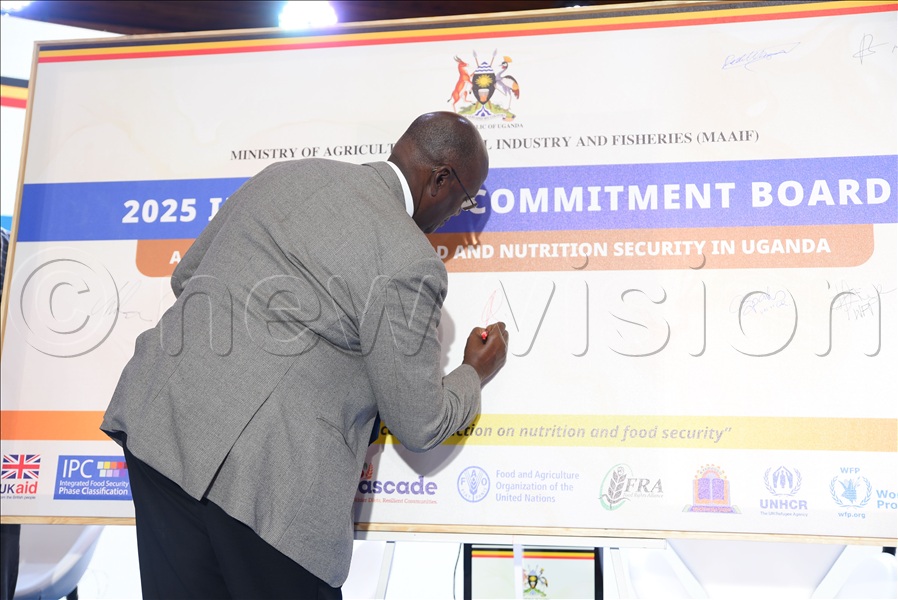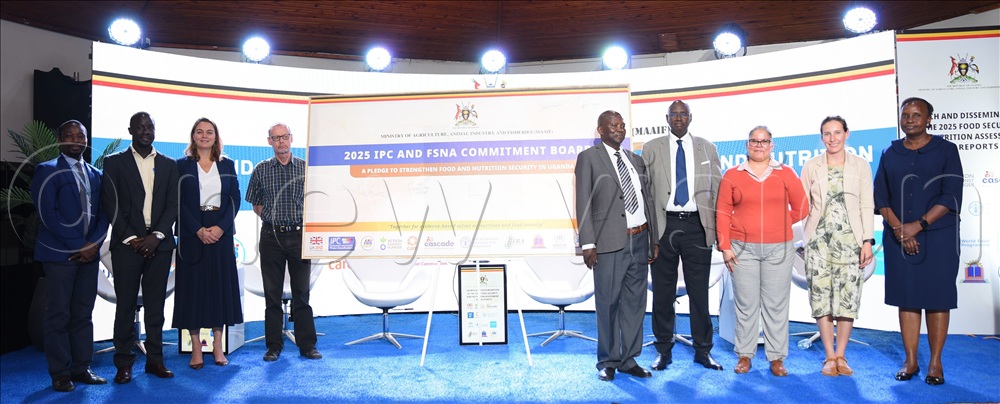3.4 million Ugandans facing acute food insecurity — report
Karamoja region remains the most severely affected area, with eight of its nine districts classified in Phase 3. The districts of Kotido (40%), Kaabong (30%), Napak (30%), and Moroto (30%) recorded the highest proportions of their populations experiencing crisis or worse conditions.
“This national food security report is comprehensive and a great milestone in helping the government to formulate necessary responses. I am pleased that it has given us an outlook that will help us combat food insecurity in the areas reported,” Rwamirama said.
Over 3.4 million people in Uganda, including those in refugee settlements, faced high levels of acute food insecurity — classified as Integrated Food Security Phase Classification (IPC) Phase 3 (Crisis) or worse — between April and July 2025, a report says.
The findings, part of a joint analysis of national and refugee populations, were released on November 6, 2025, by animal industry state minister Bright Rwamirama, at Fairway Hotel, Kampala.
The report also highlights an unprecedented malnutrition crisis, projecting that an estimated 485,000 children ages six months to five years and 91,000 pregnant or breastfeeding women will suffer from acute malnutrition between April 2025 and March 2026.
Karamoja region, refugee settlements hardest hit
Karamoja region remains the most severely affected area, with eight of its nine districts classified in Phase 3. The districts of Kotido (40%), Kaabong (30%), Napak (30%), and Moroto (30%) recorded the highest proportions of their populations experiencing crisis or worse conditions.
Among the 13 refugee settlements analysed, all were in IPC Phase 3 (Crisis). Kampala, which hosts urban refugees, was in Phase 2 (Stressed). Overall, 48% of refugee residents, totalling about 920,000 people, were food insecure, with 76,000 of those in IPC Phase 4 (Emergency). Uganda currently hosts 1.9 million refugees.
Karamoja recorded the highest severity of acute malnutrition, with three districts in IPC AMN Phase 4 (Critical). Moroto district reported the highest Global Acute Malnutrition (GAM) prevalence at 20.4%.
Refugee settlements also reported a deterioration in acute malnutrition compared to 2024, with the highest GAM rates in Adjumani, Bidibidi, and Palorinya, all classified as serious.
Rwamirama credited government commitment for improvements in some areas, but named climate change and a global funding squeeze for refugee support as major challenges. (Credit: Alex Balimwikungu)
Rwamirama preaches optimism
Rwamirama credited government commitment for improvements in some areas, but named climate change and a global funding squeeze for refugee support as major challenges.
He revealed that the acute food insecurity has been driven by poor rainfall and prolonged dry spells, which negatively affect crop and livestock production; economic challenges, such as high prices of key staples and low purchasing power; conflict and displacement, deepening vulnerabilities in Karamoja and straining resources in areas like West Nile; and reduced food assistance.
Rwamirama said the Government has developed programmes to support both refugees and their hosting communities, including a strategy focusing on water-for-production and climate-smart agriculture to address challenges like intermittent drought.
“This national food security report is comprehensive and a great milestone in helping the government to formulate necessary responses. I am pleased that it has given us an outlook that will help us combat food insecurity in the areas reported,” Rwamirama said.
Alex Bambona, assistant commissioner for Food and Nutrition Security at the agriculture ministry, in a keynote address, admitted that the country is grappling with the adverse effects of climate change.
Bambona, who chairs the IPC for Food Security Analysis Technical Working Group in Uganda, said that between 2.4 million and 4 million people face an emergency food security phase, or IPC Phase 4.
Zakaria Fusheini, head of nutrition programme at UNICEF Uganda, underscored the gravity of the malnutrition crisis, stating that an estimated 49 children become wasted every hour.
He warned that 14 children risk dying every hour from malnutrition-related causes.
“This situation is unacceptable in a country that possesses an abundance of food resources,” Fusheini said, attributing the issue to a failing food system and staggering child food poverty at 90%.
Carol Sparks, the co-ordinator for external engagement at the United Nations High Commissioner for Refugees (UNHCR), warned that the worsening food and nutrition situation among refugees is compounded by severely reduced global funding. Uganda currently hosts about 1.5 million refugees, a number projected to reach 2 million by the end of the year.
“We have seen increases in the rates of global acute malnutrition and child anaemia in several settlements in 2024,” Sparks said. She urged collective action to ensure at least a minimum level of humanitarian assistance and called for an urgent focus on strengthening self-reliance among refugees, stressing that access to land is key for cultivation.

Carol Sparks, the co-ordinator for external engagement at the United Nations High Commissioner for Refugees (UNHCR), warned that the worsening food and nutrition situation among refugees is compounded by severely reduced global funding. Uganda currently hosts about 1.5 million refugees, a number projected to reach 2 million by the end of the year. (Credit: Alex Balimwikungu)
Outlook and proposed actions
The report projects a sharp decrease in acute food insecurity between August 2025 and February 2026, with the number of people in IPC Phase 3 or above expected to fall to 2.1 million.
This is attributed to favourable rainfall, expected harvests, and continued interventions. However, all 13 refugee settlements and five national districts are expected to remain in Phase 3.
The report urges several immediate and long-term actions: humanitarian assistance to provide food and livelihood support to populations in IPC Phase 3 and Phase 4; nutrition services to scale up the identification and treatment of acute malnutrition; and WASH and resilience efforts to improve safe water, sanitation, and hygiene coverage and invest in climate-smart agriculture.
In September 2025, the British government gave a grant of 4 million pounds, approximately sh19 billion, to Uganda to finance the fight against malnutrition among the refugee community in Uganda.
British High Commissioner to Uganda Lisa Chesney announced the grant during a meeting with Prime Minister Robinah Nabbanja at her office in Kampala.
The funding, provided through UK aid, will specifically support lifesaving nutrition services in 13 refugee-hosting districts and Kampala